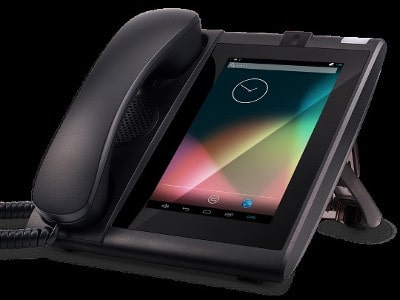
 This report was adapted by Cantech Letter from a piece prepared by Sophic Capital. For the original report, and more in-depth research, please visit Sophic Capital’s website, here.
This report was adapted by Cantech Letter from a piece prepared by Sophic Capital. For the original report, and more in-depth research, please visit Sophic Capital’s website, here.
VoIP desktop phones are displacing analog phones within the enterprise, and have been doing so for some time. Yet office phones have not evolved over the decades and largely remain user unfriendly with none of the enhancements that we have seen in the PC and mobile world. We believe that desktop phones should evolve in to smartphones loaded with productivity tools and user interfaces that enhance functionality and productivity. Some companies, like NEC Corporation of America are moving now with new hardware and app stores that enhance their offering to enterprise customers. In this report we uncover the trends in VoIP and how we see this transition playing out as well as the companies that are participating in this trend.
Reasons to Read this Report
⦁ Understand how the VoIP market is evolving and the trends that are driving growth;
⦁ Discover the solutions that make enterprise desktop telephones productive tools for workers – hint: think smart desktop phones with functionality like mobile smartphones;
⦁ Broadband access is prevalent in the world, and enterprises are adapting to this reality; and,
⦁ We reveal which companies are best positioned to monetize these trends.

Introduction
Is it time for enterprises to toss their desktop phones into the trash? We think so; at least we believe that new enterprises should not invest in legacy desktop dumb phones for their workers. Legacy dumb phones are old technology – technology that never enhanced productivity. Many people, ourselves included, struggle with unlocking the basic features that our legacy desktop phones offer. Several companies are addressing this issue by evolving those “dumb” desktop phones into smartphones loaded with productivity applications. These smartphones leverage established, useful technology – Voice-over-Internet-Protocol (VoIP). And VoIP desktop phones will vanquish their analog ancestors.
Evolution has NOT Made Desktop Phones Easy to Use
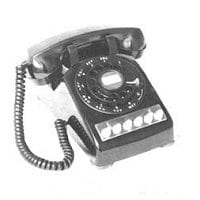
“Please hold, and I’ll transfer you over” – the most dreaded words that you’ll ever utter in an office. Everyone who has worked in an office with an enterprise desktop phone has said those words. As soon as the word “over” passes your lips, anxiety sets in as you realize you don’t know how to transfer a call to the woman in the next cubicle. You search our desks for the instruction manual although you’ve never seen a desktop phone manual. Then, you bury the telephone’s receiver into your chest to muffle your cry to your co-workers for help – “Frank, what buttons do I press to transfer a call?” Your anxiety swells in Frank’s silence. It subsides momentarily as you hear Frank inhale, but when he says that he doesn’t know, you’re crestfallen. Your office mates over the wall snicker at your incompetence. You sit alone in the cafeteria because your peers don’t want to lunch with a dope who can’t transfer a call.
Beyond touch-tone dialing and VoIP, desktop phones haven’t evolved much. Those touch-tone beeps replaced the clicking, analog rotary dial. VoIP facilitated voice and multimedia communications. Form factors and features like conference-calling crept into those big, bulky, blocks of plastic, but their functionality didn’t change significantly. What if we could replace those legacy phones with devices that had user-friendly apps; devices that communicate using the Internet?
We Don’t Think Desktop Phones Will Vanish but…
Although more workers are using mobile devices both inside and outside of the enterprise, we believe the desktop phone will always have a home in the enterprise. Mobile communications have expanded worker duties beyond their desks. However, there are several occupations where fixed telephones are needed by policy and even by law. Usually, the reasons include privacy or life and death situations. Hospital workers and police and fire department dispatchers are occupations that fit these categories. For these occupations, we believe desktop phones are the better alternative to mobile devices. If we look at the hospitality industry, some hotels may not replace desktop phones with mobile devices for their customers to steal use. Even in the enterprise, employees likely don’t want to perform workplace functions on mobile phones; functions like hosting conference calls and transferring calls. Background noise from any participant and the data generated from multiple sources may be too much for a mobile device to handle.
… VoIP Desktop Phones Will Replace their Analog Ancestors

Analog phones are on their way out. Not because of consumer rejection but due to government laws and telecommunication companies requesting to transition to VoIP networks. BT (NYSE:BT), for example, is petitioning Ocfom, the U.K.’s communications regulator, to allow the telco to transition its customers to VoIP. Verizon (NYSE: VZ) and AT&T (NYSE:T) are lobbying states to eliminate POTS (plain old telephone system), analog telephone service over copper. And in the United States, from 2008 through 2013 the FCC reported declines in switched access lines (POTS) and increases in VoIP across both residential and business users (Exhibit 1). Figure 2 shows the global, slow decline of fixed voice subscriber as fixed broadband subscribers creep upward. Ovum claims fixed voice subscribers will remain over a billion by the end of 2015 but fall to about 904 million by 2019. The firm attributes this decline partly to the increasing adoption of VoIP. And it’s not only the United States making this transition; in France, one in three people use VoIP. France has an excellent infrastructure which the telecoms leveraged to make VoIP accessible.


Market forecast firm Frost & Sullivan sees modest growth in IP desktop phones (Exhibit 3). The firm believes the replacement of TDM phones (phones with a dedicated line into the enterprise’s phone system), growth in developing regions, and cloud-hosted IP phones will contribute to the expanding presence of IP desktop phones.

Korea
There was a time when people wanted to know where the best telecom and consumer electronics were found, Japan would come to mind. No more. If you want an idea of where telecom is headed, you need not look further than the Land of Morning Calm – Korea.
In 2015, the International Telecommunications Union (ITU) ranked the Republic of Korea first out of 167 countries for access to information and communications technology. (Canada ranked 23rd, and the United States was 15th.) The ITU is a United Nations agency that allocates global radio spectrum and satellite orbits and develops technical standards to ensure networks and technologies seamlessly interconnect. Korea has ranked first in 4 out of the last 6 years, and in 2015, the country claimed to have 115+ mobile phone subscribers per 100 people and almost 60 fixed lines per hundred people.
Koreans were early adopters of VoIP. By June 2011, the country had 10.1 million VoIP subscribers (Korea’s population was 49.8 million, at the time). One reason that Koreans led is because of their ease of access to high-speed, broadband Internet. And that trend continues; by 2014, Korea had the highest fixed Internet subscription penetration for speeds over 10 Mbps (Exhibit 4).
Other Nations Transition to Broadband
As Exhibit 4 illustrates, high speed fixed broadband has overtaken sub-10Mbsp access across numerous countries. The ITU anticipates fixed broadband to grow at the same rate as Internet access growth. Ovum, a telecom research provider, states that there were 699 million fixed broadband subscribers and that this could grow to 920 million by 2019.

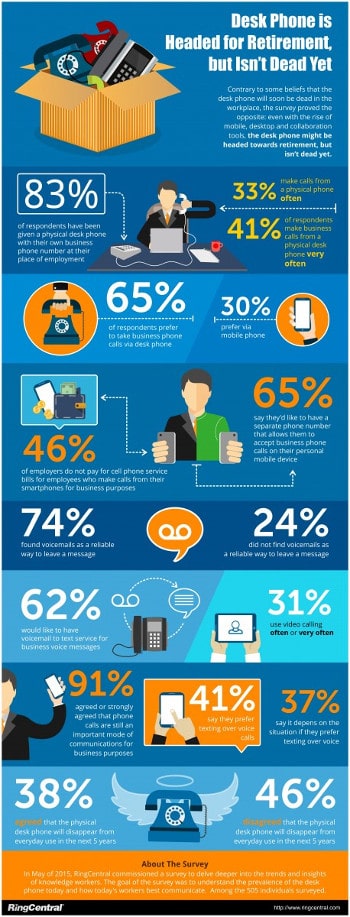
Workers: Beware of Desktop Phones
Fear of phones is real in the enterprise, especially amongst younger employees. Exhibit 5 shows how acute the problem is; the younger the employee is, the more likely he’s afraid to use the desktop phone in business (face-to-face communication was the favourite form of workplace communication followed by email). Although the majority of workers under the age of 44 fear office phones for business communications, RingCentral estimates that 83% of workers are issued a desktop phone. The interesting thing about these stats is that when office employees must use a phone, 65% prefer to use their issued desktop phone over their mobiles. Therefore, it is imperative that enterprises optimize desktop phone functionality to optimize employee output. But there’s a problem…
Desktop Phones Are Dumb
Those dreaded office desktop phones aren’t exactly easy to use. And over the decades, they really haven’t evolved to provide more than inbound/outbound communications, conference calling, and call transfers. Whether it’s analog or IP-based, the traditional desktop office phone is dumb and doesn’t improve the basic necessary functionality that many people (ourselves included) need. We don’t know how to use the darned things. We’d love to push a screen icon to transfer a call and have a list of co-worker names pop open – select a name and the call transfers. Done. Two taps and the call is switched. No more harassing co-workers or the IT department. But if we could make phones smart enough to make us more productive, could they not simplify our lives in other ways; outside of our workplace?

A Desktop Smartphone App We’d Love to See
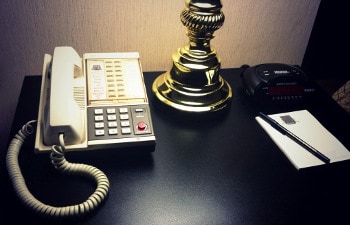
Hotels are one area where it makes sense to have a desktop smartphone. In the olden days, hotels used to make a lot of money from guests making local and long distance calls. Now, people use their mobile phones or VoIP apps like Skype and Google Hangouts. Telephones don’t generate much revenue for hotels any more.
Rating agencies like AAA specify the types of guest room telephones required to comply with its diamond ratings (Exhibit 6). Similarly, European hotels must have telephones within guests’ rooms in order to obtain a 3-star rating with the Hotelstars Union.
We believe there’s one primary reason why hoteliers install telephones in each guest room. It’s not to provide guest services; not comply with rating agencies; we believe hoteliers provide telephones in guest rooms to avoid lawsuits. Given our litigious society, hoteliers want guests to have access to 9-1-1 services should an emergency occur. Dial 9-1-1 or “0” for the front desk and the room where the emergency is occurring is known. Not true when dialing 9-1-1 from a cell phone (assuming the guest has a cell phone). The alternative is guest injury or death which could not only result in hefty settlement payments but also increased insurance premiums.
Assuming our theory is correct and that hotels have no desire to remove telephones from guest rooms, let’s make those phones useful beyond 9-1-1 calls and calls to reception. What if instead our smart desktop phone allowed hotel guests to book concert tickets and restaurants, order room service from an on-screen menu, and checkout and pay the bill? These types of guest-driven interactions allow guests to create their own experience without the need to engage hotel workers, thereby reducing the hotel’s costs. And although desktop smartphones may reduce hotel costs, we doubt they’ll do little to minimize our own – no app could eliminate those $4 charges for local calls – assuming you can figure the number needed to dial an outside local line and stop that red light from blinking all weekend if you press the wrong number. But consider this about that $4 charge: Depending upon the call’s length, $4 could be far less expensive than using a mobile phone if roaming in a foreign country.

Apps that Could Save Lives

Hospital care can improve with seamless communications. Connecting people at the right time with the right information can be an issue of life and death. If a patient wanders, someone needs to issue a global alert to all departments, especially security. Similarly, a nurse may need assistance with a patient and may not have the time to recall which button to push for help. Nor may she have the time to explain the issue. Having a smartphone display one-touch emergency apps would eliminate these types of problems.
Returning patients can cost more. There are situations when patients are discharged but have to return to the hospital in similar or worse conditions. Patients improperly taking their medications is one reason for this to happen; patients not taking care of treated injuries is another. The net effect is increased costs to hospitals. One solution is to lend patients a video phone upon discharge, then schedule video conferences to check the patient’s progress. The app could send email reminders to all participants and then ring them all. This would help to facilitate positive outcomes for patients and reduced costs for hospitals.
Apps that Increase Productivity
In Sync. We often encounter the problem of scrolling through our smartphone or laptop contact info lists to find a number to dial on our desktops. What we’d prefer is the ability for our desktop phone to sync with the contact lists on all of our devices (or those that we specify) so that we could scroll through a directory, tap a contact name, and dial. A conference call feature that allows us to select names in our desktop phone’s contact list and connect them to a conference call is the stuff we dream about. Taking our master contact list further, give us the ability to transfer calls by tapping an app, scrolling through the list, and hitting a screen button to transfer – no more searching for that thin strip of paper that contains everyone’s extension. Let’s push our contact list app a little further – what if it also integrated co-worker calendars so that we could see when they’re available.
Voice Mail. We’re living wildly here. An app that has soft buttons named “play”, “save”, “delete”, “replay” instead of “1”, “2”, “7”, “9”.
Tell me what I’m doing. After walking into our cubicle and setting our tall, Belgian mocha, foamy, goat milk macchiato onto the table, it would be nice if we could push a soft key on our desktop phone’s screen to display our day’s itinerary. This would be much simpler than logging into our laptop and clicking the mouse a few times (yes, we’re lazy). Then, throughout the day, the phone could chime alerts to keep us on schedule. And if we needed to travel offsite, perhaps it could give us a map and directions that could be pushed to our mobile phone.

NEC Answers our App Prayers
NEC Corporation of America, a technology integrator providing solutions that improve the way people work and communicate, is capitalizing on both the desktop smartphone and app trends. On January 6, 2016, NEC Corp. (TYO:6701) opened an online app store for the Company’s UT880, a desktop smartphone developed by Sophic Capital client Apivio Systems (TSXV:APV). Customers can access NEC’s app store via the UT880 Android-based phone.
Three categories of apps are available:
⦁ General market apps, a portfolio of basic business tools and entertainment apps;
⦁ Premium market apps, productivity enhancement apps offered under NEC’s Premium Software Assurance program, and;
⦁ Premium Select Market apps, which will be available in the future and consist of industry-specific apps as well as third-party apps.
NEC’s app store builds upon the relationship the Company has with Apivio Systems. The two companies recognized the opportunity to supply desktop smartphones into the enterprise and created a partnership in 2014 to capture this market. To date, Apivio has shipped about 10,000 UT880 Android enterprise VoIP phones to NEC. That means 10,000 phones will require apps, and apps sold to enterprises are generally sold at a premium.
Market Size
VoIP
According to Future Market Insights (FMI), the corporate consumer VoIP segment in 2012 had 98.9 million subscribers worth about US$ 43.27 billion of the total global VoIP services market. FMI also forecasted that by 2020, these numbers would increase to about 204.8 million subscribers and US$86.20 billion. The firm noted that in 2012 35.9 million subscribers the phone-to-phone segment accounted for US$15.88 billion, and they should scale to 116.5 million subscribers in 2019 who generate US$44.78 billion of revenue. The 58.3 million computer-to-phone subscribers in 2012 created US$27.35 billion of revenue, and they will grow to 128.3 million by 2019, accounting for US$56.56 billion of revenue.
Transparency Market Research believes the global VoIP services market will grow at a 9.7% CAGR from 2014 to 2020. The research firm states that the 2013 market was worth US$70.90 billion and will increase to US$136.76 billion by 2020 with 348.5 million subscribers. Smartphones and tablets, both consumer and enterprise, will help drive the growth.
Enterprise Telephony
The enterprise telephony market could contract by 20% from 2015 through 2019. In an interview with crn.com, Dell’Oro analyst Alan Weckel stated that the market could decline from $10 billion in 2015 to $8 billion by 2019. Mr. Weckel cited the transition to integrating premise equipment into other equipment or obtaining similar functionality from the cloud.
Companies
Alcatel-Lucent (NYSE:ALU) is an Internet protocol networking, cloud technology, and ultra-broadband access specialist. Their IP-based desktop smartphones (8808 and 8802) provide immersive and easy user experiences, with the 8808 targeting the hospitality market.
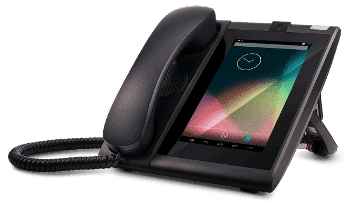
Apivio Systems (TSXV:APV), a Sophic Capital client, develops telephones and applications for the enterprise and consumer VoIP markets. Apivio has sold more than 5 million handsets, mostly in Asia. Although Apivio’s Korean business is on track to generate over C$50 million in 2015 revenue and is cash flow positive, Apivio’s stock trades at about 3.8x EV/EBITDA of the Korean business alone. Cash flow from Korea has been funding R&D and development for the Company’s Android-based VoIP smart desk phones. Apivio entered into partnership with NEC in 2014, where NEC is exclusively using Apivio’s UT880 Android-based smart desk phone for their customers. Together NEC and Apivio are disrupting the desktop phone market by developing enterprise applications that will transition desktop phones into the 21st century. At the same time Apivio is transitioning from a hardware-only technology company into a hardware and software company selling high-margin productivity applications. In essence, Apivio plans to move from a hardware company to an innovation company.
Apivio has three phone families: Dexter IP phones, Monet Android-based phones, and Liberty Wi-Fi phones. The Dexter series is a legacy desktop IP phone that provides the foundation for the Company’s revenues. Currently, the Dexter series is sold to all the largest telecom carriers in South Korea. The Monet series is an Android-based video smart phone meant to replace regular desktop phones. After getting Monet installed in enterprises, the Company plans to monetize applications that should generate high-margin, recurring revenues. The first Monet series model is the UT880 that is sold through NEC North America. Apivio has shipped 10,000 UT880 Android VoIP phones so far – part of Apivio’s strategy to sell through OEMs rather than sell directly to enterprises. Our understanding is that other NEC subsidiaries are now interested in selling the UT880 phone in their countries. NEC has also opened an app store to support the sale of apps on these phones. Apivio’s Liberty phones are Wi-Fi phones targeted at both enterprises and consumers. As long as Wi-Fi is available, a Liberty phone will authenticate and turn on, giving the user the freedom to roam anywhere in the world without getting those nasty surprise telecom bills. (One CEO we met with shared that after returning from an Asian business trip, he received a bill from a Canadian carrier for over $2,600. It turns out that the travel package he purchased didn’t cover the Asian country where he was conducting his business – however, he was told that the package did cover calls in the Caribbean which, the last time we checked, wasn’t anywhere close to Asia.) Apivio has sold over 100,000 Wi-Fi phones into the South Korean market. We believe the Liberty could be a complementary product to the UT880 in the enterprise since it will allow an enterprise user to walk around the office or facility with the desk phone in their pocket.
Avaya (private) provides technologies for unified communications and collaboration, contact center and customer experience management, and networking, along with related services. The Company offers IP desk phones as well as a family of wireless IP handheld phones. These wireless handhelds offer features like conferencing and directory access even as users move throughout a building or across a campus. To complement these devices, Avaya also supplies networking gear and cloud services to provide complete enterprise networks.
Cisco Systems (NASDAQ:CSCO) designs and manufactures IP-based networking gear and other products related to the communications and information technology industry. The company also supplies services related to these products and their use. A wide selection of IP-based, feature-rich phones (88xx series and DX650) are available that support collaboration amongst employees as well as high-definition voice, video, conferencing, messaging, and cloud service access.
CloudTC (private) is a Silicon Valley software innovator specializing in business apps and IP telephony. The Company develops Android-based media phones – Glass. Glass offers high-definition audio, one-touch calling, and the CloudTC App Market.
Mitel (NASDAQ:MITL, TSX:MNW) powers over 2 billion business connections every day. The Company has several families of UCC business communications solutions across its Premise and Cloud segments, with Premise comprising products and services for premise-based customers. In January 2014, Mitel and Aastra Technologies merged to create a company serving over 60 million business users in over 100 countries, and 130 mobile service providers including 15 of the world’s top 20 mobile carriers.
Polycom (NASDAQ:PLCM) offers voice, video and content sharing solutions for over 400,000 companies and institutions. The Company’s video, voice and content-management and content-sharing solutions include immersive telepresence and conference room systems, home/work office solutions, applications for mobile devices, browser-based video collaboration and cloud-delivered services. Polycom’s family of IP phones include desktop units that use Microsoft Skype for Business.
ShoreTel (NASDAQ:SHOR) sells cloud, premises-based and hybrid business telephony and unified communications solutions. ShoreTel’s solutions remove the barriers and complexity common with old phone systems, unified communications upgrades, or contact center modernization. Companies can buy or subscribe to the business communication solutions they require without risking their original investment should their needs change tomorrow.
Ubiquiti Networks (NASDAQ:UBNT) develops high-performance networking technology for service providers and enterprises. Among its product offerings is the Unifi Android-based desktop VoIP smartphones and a full range of Android apps. Two of the Unifi VoIP phones come with Wi-Fi, making them portable.
Unify (private) is a global communications software and services company. With engineering roots from Siemens (ETR:SIE), provides integrated communications and networking solutions for 75% of the Global 500 across 60 countries. On November 3, 2015, Atos (EPA:ATO), a French digital services company, agreed to purchase Unify from investment firm Gores and Siemens for an undisclosed price.
Conclusion
Not all desktop telephones are going away. Even though many workers have smartphones, 83% of workers are issued desktop phones, and 65% of workers prefer to use their issued desktop phone over their mobiles. We believe that smart desktop phones loaded with productive applications will eventually displace traditional VoIP and analog desktop phones.
Acronyms Used in this Report
BYOD bring-your-own-device
IP Internet protocol
ITU International Telecommunication Union
Mbps megabits per second
POTS plain old telephone system
UCC unified communications and collaboration
VoIP voice over Internet protocol
Disclaimers
The information and recommendations made available here through our emails, newsletters, website, press releases, collectively considered as (“Material”) by Sophic Capital Inc. (“Sophic” or “Company”) is for informational purposes only and shall not be used or construed as an offer to sell or be used as a solicitation of an offer to buy any services or securities. You hereby acknowledge that any reliance upon any Materials shall be at your sole risk. In particular, none of the information provided in our monthly newsletter and emails or any other Material should be viewed as an invite, and/or induce or encourage any person to make any kind of investment decision. The recommendations and information provided in our Material are not tailored to the needs of particular persons and may not be appropriate for you depending on your financial position or investment goals or needs. You should apply your own judgment in making any use of the information provided in the Company’s Material, especially as the basis for any investment decisions. Securities or other investments referred to in the Materials may not be suitable for you and you should not make any kind of investment decision in relation to them without first obtaining independent investment advice from a qualified and registered investment advisor. You further agree that neither Sophic, its employees, affiliates consultants, and/or clients will be liable for any losses or liabilities that may be occasioned as a result of the information provided in any of the Company’s Material. By accessing Sophic’s website and signing up to receive the Company’s monthly newsletter or any other Material, you accept and agree to be bound by and comply with the terms and conditions set out herein. If you do not accept and agree to the terms, you should not use the Company’s website or accept the terms and conditions associated to the newsletter signup. Sophic is not registered as an adviser under the securities legislation of any jurisdiction of Canada and provides Material on behalf of its clients pursuant to an exemption from the registration requirements that is available in respect of generic advice. In no event will Sophic be responsible or liable to you or any other party for any damages of any kind arising out of or relating to the use of, misuse of and/or inability to use the Company’s website or Material. The information is directed only at persons resident in Canada. The Company’s Material or the information provided in the Material shall not in any form constitute as an offer or solicitation to anyone in the United States of America or any jurisdiction where such offer or solicitation is not authorized or to any person to whom it is unlawful to make such a solicitation. If you choose to access Sophic’s website and/or have signed up to receive the Company’s monthly newsletter or any other Material, you acknowledge that the information in the Material is intended for use by persons resident in Canada only. Sophic is not an investment advisory, and Material provided by Sophic shall not be used to make investment decisions. Information provided in the Company’s Material is often opinionated and should be considered for information purposes only. No stock exchange anywhere has approved or disapproved of the information contained herein. There is no express or implied solicitation to buy or sell securities. Sophic and/or its principals and employees may have positions in the stocks mentioned in the Company’s Material, and may trade in the stocks mentioned in the Material. Do not consider buying or selling any stock without conducting your own due diligence and/or without obtaining independent investment advice from a qualified and registered investment advisor.
Leave a Reply
You must be logged in to post a comment.



 Share
Share Tweet
Tweet Share
Share




Comment